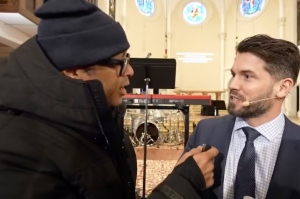When mean people are dying

There’s an older person our family knows who is progressing towards death. And the way things stand right now, those who will miss her when she’s gone slides back and forth from the low single digits to zero.
She’s been abusive to her immediate family and everyone around her for decades, and literally personifies the ultimate me-monster. The staff at the medical facilities she’s transferred in and out of don’t hide their glee as she exits their doors, telling family members they’re glad she’s off their payroll. Those same family members receive her direct assault every single day, get little reprieve, and struggle with anxiety and exhaustion 24x7.
It ain’t a pretty scene when mean people are dying.
Maybe you know individuals who are in a similar kind of turbulent situation with someone, or perhaps you’re experiencing the same stormy squalls yourself. Do you take a suck-it-up-buttercup approach where you grin and bear it, eventually throw in the towel (if you can), or something else?
For some guidance, how about we check the Bible and see if it has some help for us?
Ministering to the nasty
There’s a scene in the second season of “The Chosen” that lasts for only a few seconds but it really made a portion of Scripture I’ve read a gillion times come alive in living color.
There are multiple places in Christ’s biographies that read like this: “Jesus withdrew to the sea with His disciples; and a great multitude from Galilee followed … a great number of people heard of all that He was doing and came to Him ... for He had healed many, with the result that all those who had afflictions pressed around Him in order to touch Him” (Mark 3:7-10, my emphasis).
“The Chosen” shows the conclusion of just one of those healing sessions and has Jesus staggering back to His tent, breathing heavily, His clothing stained with blood. Their point? Ministering to others in general can be wearying work even if you’re the Son of God. Tending to the nasty is especially exhausting work.
Don’t you wonder about the people who sought out Christ? Do you think they all were just the bee's knees and loving or isn’t it reasonable to believe that, among the large crowds of people who clamored for His attention, there were more than a few who were unkind and maybe downright cruel?
The Bible makes one thing plain: pretty much all of them were out for themselves and didn’t care about the Person easing their suffering or what would happen to Him afterward. The “many” that he cured were conspicuously absent at His trials and crucifixion.
This fact coupled with Jesus’ healing sessions brings to life a statement in Luke that reads, “for He Himself is kind to ungrateful and evil men” (Luke 6:35).
In their commentary on the passage, Hendriksen & Kistemaker say, “The ungrateful are those who do not from the heart thank God for the blessings he bestows on them … They fail to complete the circle; that is, when blessings drop down from heaven upon them, they do not make any return in the form of humble praises rising from earth to heaven.”
“Ungrateful and evil men”. Sounds a little like the dying woman my family knows. But then Jesus said all of us were evil in His Sermon on the Mount (“If you, then, being evil…” — Matt. 7:11).
You see where I’m going with this, right? As Christ's followers, we’re asked to serve both the lovely and the unlovely. C. S. Lewis reminds us that, “with Christian morals ‘thy neighbor’ includes ‘thy enemy.’”
Now, when we imitate Christ in that way and are “merciful, just as your Father is merciful” (Luke 6:36) to the unkind who are unbelievers and “bear the weaknesses of those without strength and not just to please ourselves” (Rom. 15:1-3), there are two possible outcomes. One is that our acts of kindness are used by God to change their heart, lead them to Him, and ultimately alter the person’s eternal destination.
Does that happen? You betcha.
For example, in an interview with the Wall Street Journal, Brian Johnson, the lead singer of the rock band AC/DC, talked about his upbringing in Dunston, England, which he described as “drab, hard, distant, and unwelcoming.” But when he was put into a different environment with a family that was loving and warm, he said “life there knocked the cruel out of you.”
The Jewish scholar Philip Holley had a similar experience while investigating Nazi war crimes, which made him so angry and depressed that he almost committed suicide. But when he read about a small village that showed courage and the love of God by rescuing 5,000 Jewish children during the holocaust, Holley described his internal breakthrough as “heart-cracking goodness.”
The other possibility, sadly, is that the expressions of help and love delivered have no change in the person’s heart whatsoever. Then, it’s not so much about them as it is about ourselves — God is using the same experiences His Son underwent with the heartless to uncomfortably mold us into His image.
On this point, it’s Lewis again who says: “Whenever we do good to another self, just because it is a self, made (like us) by God, and desiring its own happiness as we desire ours, we shall have learned to love it a little more or, at least, to dislike it less.”
What about us?
Let’s finish by switching gears and, instead of talking about us as caregivers to someone else, how about we chat about you and me being the patient?
If Christ doesn’t return in our lifetime, it’s going to happen to each of us. We’ll be the ones in the bed — hurting, unhappy, frustrated, and wishing for something better. How will we treat those around us at that time?
Let me give you a night-and-day contrast with the unpleasant person I started us off with.
I know an elderly woman who has been a widow for decades now. If anyone asks me what a Christian is supposed to look like, I aim them at her.
I check in on her from time to time and a few weeks back she wasn’t as prompt in getting back to me as usual. I got worried and pinged her again, and after a day or so I was relieved to see her come up on my caller-ID.
I asked how she’d been and she said, “Oh Robin, this has been a hard summer for me.” She then went on to say, without any heart-tugging emotion, that she 1. had to have her pacemaker redone; 2. had knee surgery; 3. has a painful back problem that is ever present; 4. just experienced paralysis with one of her vocal cords.
But then she stopped abruptly and said, “But Robin, I’m content. I’m thankful for what I do have. I just want God to use me in any way He can.”
Immediately, she then did a 180 and asked, “Now tell me about how you’re doing. How is Laura [my wife]? How are your girls? What’s new with them?” Having questioned me about myself and family for a while, she then moved on to God.
“Tell me what new devotions you’re reading. How’s church? What on your heart these days?” Having gotten answers on all those subjects, she wrapped up our call by saying, “Now let me pray for us” and did so by thanking God for our relationship and Christ who is our salvation.
And yes, she’s like that with everyone.
Do you know what’s the saddest thing I hear from those who minister to the mean and nasty that are dying? Sooner or later, they say, “I hate to say it, but right now, I’m not going to miss them when they’re gone.”
Question: how do you think my widow friend who’s hurting right now will be remembered? Do you think she’ll be missed?
She’ll be loved, missed, and remembered for who she is — an image bearer of Jesus. It’s my prayer that you and I can be filled by the Holy Spirit each day like she is so that, no matter our circumstances, we can be remembered the exact same way.
Robin Schumacher is an accomplished software executive and Christian apologist who has written many articles, authored and contributed to several Christian books, appeared on nationally syndicated radio programs, and presented at apologetic events. He holds a BS in Business, Master's in Christian apologetics and a Ph.D. in New Testament. His latest book is, A Confident Faith: Winning people to Christ with the apologetics of the Apostle Paul.



























